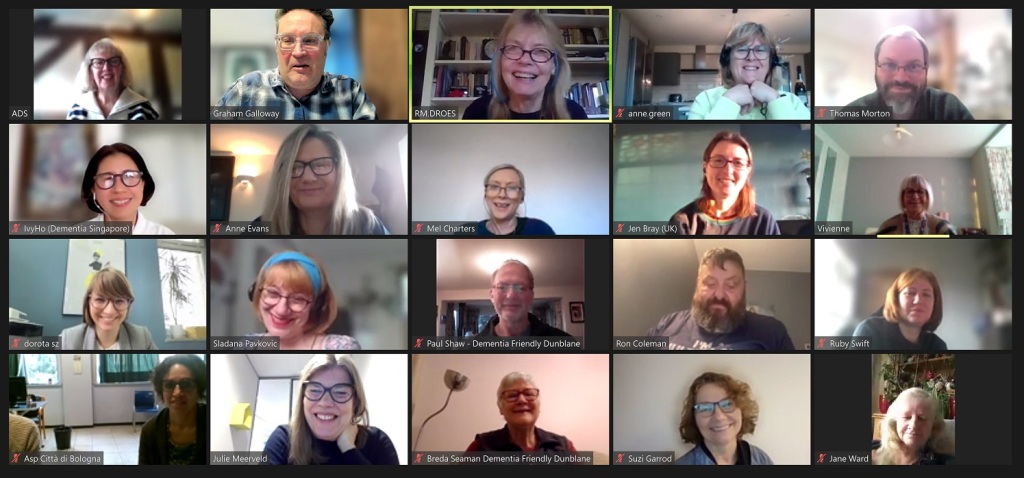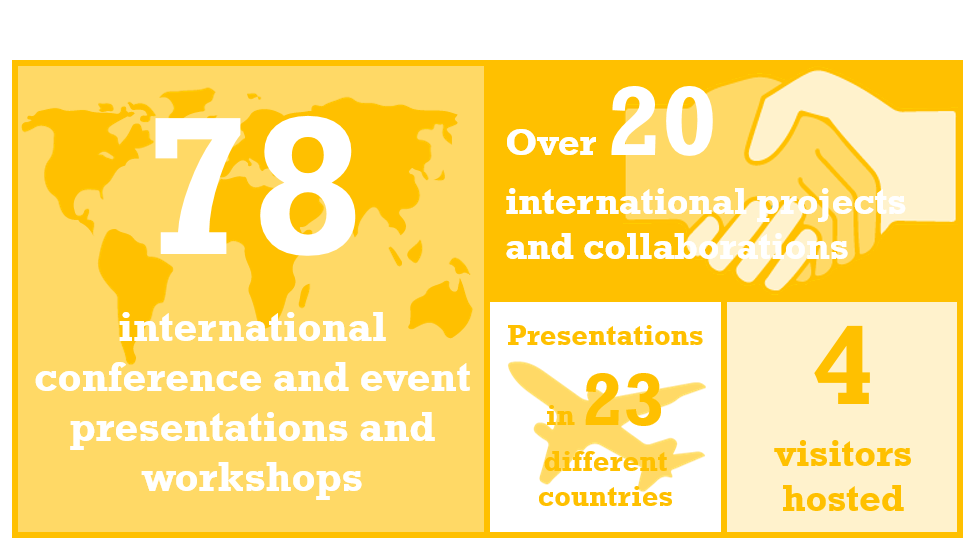At the start of February over 20 people got together online from different countries to get an update on what’s going on with Meeting Centres across the world. The session builds on the regular fortnightly meetings that we’ve been facilitating in the UK and those taking place in Scotland, where we find it useful to keep track of who’s doing what. It provided an informal chance to catch up with each other and share experiences, challenges and ideas.
Dr Shirley Evans led the session, but we were pleased to welcome Professor Rose-Marie Dröes who developed the Meeting Centre model and was the driving force behind Meeting Centres in the Netherlands.
There was a strong UK contingent from England, Scotland and Wales, but also representatives from the Netherlands, Singapore, Italy, Poland, and Australia. As it was the first meeting there was a fairly open agenda, with ideas being shared about what it would be good to cover in future sessions. The main part of the session revolved around getting a short update from each country.

Scotland – Meeting Centres Scotland, an independent third sector organisation, has just been established and is now up and running. Meeting Centres feature strongly in new Scottish Dementia Strategy, and the Meeting Centre network has a good relationship with the Scottish Government. A lived experience panel was a core part of the strategy development. An implementation plan is coming soon (mid-February) and again Meeting Centres will be part of that. There are nearly 20 Meeting Centres across Scotland with a good amount of interest at both a local and national level.
Singapore – After two Meeting Centres were set up as an initial pilot there are now seven Meeting Centres with another coming soon. They are getting interest from other areas to look at setting up Meeting Centres in Dementia Friendly Communities, of which there are 17 in Singapore. Dementia Singapore has moved to helping other partners to help set up new Meeting Centres instead of running them themselves as they did with the pilot. They are using a ground-up approach, identifying the needs in the local community, so people can see the purpose of getting new Meeting Centres up and running. There was government funding for the two pilot Meeting Centres, but the other Meeting Centres are funded by individual partners as part of their existing work.
Poland – The two Meeting Centres set up as part of the initial MeetingDem project are still running. There have been challenges trying to get further Meeting Centres set up, but it is hopeful that a change in government may improve the situation and get a Polish Dementia Strategy in place. Work has been going on engaging different professionals and students at Meeting Centres to help offer a variety of activities. There has been interest from other parts of Poland but it is currently unclear what progress has been made. Hosting the Alzheimer’s Disease International conference in Krakow in April this year may help to stimulate more activity.
Australia – Two Meeting Centres had been running and working really well, but the impact of Covid and other internal issues meant that neither is currently running. They are taking a step back to plan a new approach to get things going again, hopefully in collaboration with other organisations such as Dementia Australia. Potential funding is being identified that could help to start new Meeting Centres, and the future is looking quite positive as the Meeting Centre concept has already been proved through the previous piloting work. They have found it useful to learn from other countries to know how to overcome some of the barriers that they have encountered previously.
Italy – The initial Meeting Centre from the MeetingDem project is still running, and Meeting Centres are promoted as a social intervention as part of the regional strategy in Bologna. They are planning to open a new Meeting Centre in a different part of the city later this year after being delayed by the pandemic. Elsewhere, Meeting Centres are seen more as a medical rather than social intervention. The network of Meeting Points may be a useful route to developing further Meeting Centres and is worth investigating. Work is also in progress to set up more Meeting Centres in different parts of Italy which may have their own challenges, such as being close to the border with other countries.
Wales – Five Meeting Centres have been set up in Powys with four currently in operation covering four very different towns and communities across the county. Grant funding is becoming harder to secure as Meeting Centres are no longer a ‘new project’. The Meeting Centre provider has been trying for many years to access Welsh Government funding and was only able to do so recently, due to being on the brink of closure, but not at the levels they were aiming to secure. The Welsh Government has been addressing funding issues in The Senedd and putting pressure on the local Regional Partnership Board to fund the Powys Meeting Centres. The Meeting Centre provider is leading on the Community Engagement element of the Active Listening Campaign in Powys which is feeding into the All Wales Dementia Care Pathway of Standards. Work is also underway to set up a Meeting Centre in the Neath Port Talbot area of Wales.
England – Meeting Centres have taken off after the initial two pilots started as part of the MeetingDem project, both of which are still running. There has been lots of interest from across the country, and at a regional level, such as Council funding to open nine new Meeting Centres in Worcestershire. Many Meeting Centres tend to be in small market towns although there are some in more urban areas and cities. Work is still underway to get Meeting Centres up and running in London, but there is some interest currently so that is looking promising. It was recognised that a lot of organisations struggle with funding and getting Meeting Centres running for more than one day a week, as it can be difficult to be self-sustaining and funding tends to be short-term and focused on new ideas. It was also commented that Meeting Centres need to engage with other community groups so people have something to move onto when a Meeting Centre is no longer appropriate or able to support their needs.
It was questioned whether it could be easier to access arts funding rather than social care funding, as Meeting Centres are social clubs and can often have a strong arts focus. This is an area for some Meeting Centres to explore in the future.
It was great to hear from people around the world and appreciate the spread of Meeting Centres as it can be easy to get caught up in your own area and not realise how you’re part of something amazing on a much bigger scale. We’re hoping to have another session in the summer where we’ll aim to hear from a couple of Meeting Centres in more detail. Thanks to everyone to contributing to this first international session, I think we can say that it was a success!
For those who were unable to attend the session or who would like to find out more, a recording can be found here.
Connect with Meeting Centres on twitter @MeetingCentres
Connect with ADS on twitter @DementiaStudies and on Facebook @adsuow We’re also on Instagram, Threads and LinkedIn so have a look and find us there too.

